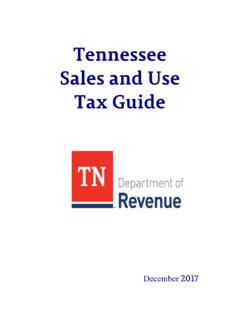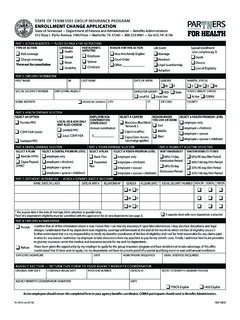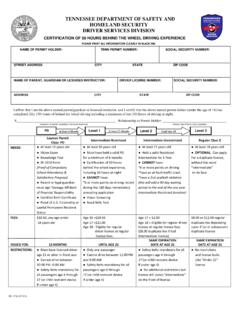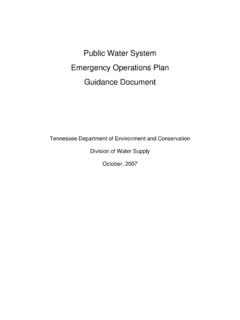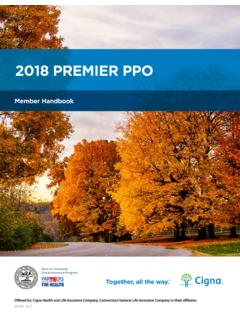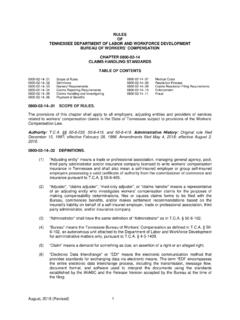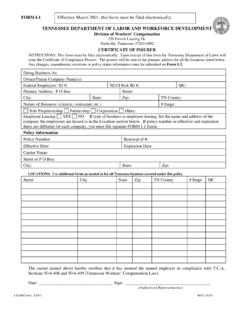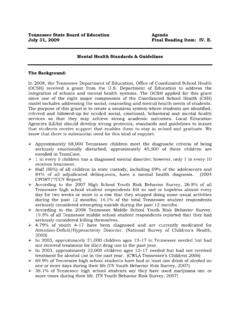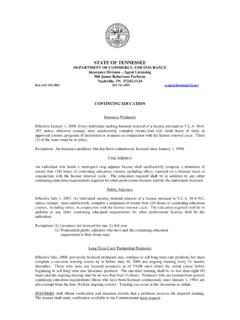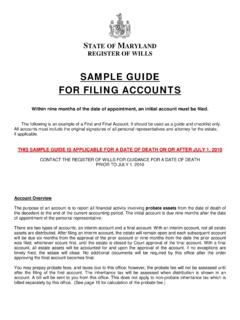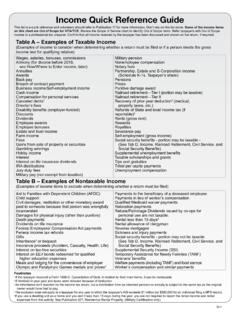Transcription of Tennessee Inheritance Tax Guide - TN.gov
1 Tennessee Inheritance Tax Guide August 2016 2 Tennessee Inheritance TAX Guide TABLE OF CONTENTS General Information 3 Completion of Return Tennessee Estates 5 Non-resident Estates 5 General Instructions 5 Signature and Verification 6 Supplemental Documents 6 Valuation General 6 Alternate Valuation 6 Special Use Valuation 7 Specific Instructions by Page or Schedule Page One 8 Page Two General Information 8 Page Three Recapitulation 9 Page Four Tax Computation 9 Schedule A Real Estate 9 Worksheet Special Use 10 Schedule B Stocks and Bonds 10 Schedule C Cash, Notes and Mortgages 12 Schedule D Insurance on Decedent s Life 12 Schedule E Jointly Owned Property 13 Schedule F Other Miscellaneous Property 14 Schedule G Transfers During Decedent s Life 14 Schedule H Powers of Appointment 15 Schedule I Annuities 16 Schedule J Miscellaneous Deductions 16 Schedule K Debts and Mortgages 17 Schedule M Bequests to Surviving Spouse 18 Schedule O Charitable Bequests 21 3 Tennessee Inheritance TAX General Information What Is Inheritance Tax?
2 Inheritance tax is imposed on the value of the decedent s estate that exceeds the exemption amount applicable to the decedent s year of death. The net estate is the fair market value of all assets, less any allowable deductions such as property passing to a surviving spouse, debts and administrative expenses. The Inheritance tax is paid out of the estate by the executor, administrator or trustee. Note: The Inheritance tax is repealed for dates of death in 2016 and after. Who Must File? Estates of Tennessee residents with a gross value in excess of the exemption allowed for the year of death must file an Inheritance tax return (INH 301). Also, estates of nonresidents holding property in Tennessee must file an Inheritance tax return (INH 301). If the value of the gross estate is below the exemption allowed for the year of death, an Inheritance tax return is not required. However, if the estate is undergoing probate, a short form Inheritance tax return (INH 302) is required.
3 In all cases, once an Inheritance tax return is filed, reviewed, and payment of all taxes due (if any) is remitted, the department will issue an Inheritance Tax Closure Certificate. Line-by-line instructions for the INH 301 form follow in this Guide . Instructions for the short form (INH 302) are on the form itself. What is the Exemption Amount? The exemption available depends on the date of the decedent s death: Date of Death Estate Gross Value Exemption Amount 2005 $950,000 2006 2012 $1,000,000 2013 $1,250,000 2014 $2,000,000 2015 $5,000,000 2016 and after No Tennessee state Inheritance tax imposed for decedents dying after December 31, 2015. Due Date of Returns Returns are required to be filed within nine months of the date of death.
4 4 Extensions An extension of up to one year is granted provided one of the following is attached to the return filed on or before the extended due date: Tennessee INH304 Application for Extension of Time to File Inheritance Tax Return. Federal form 4768 Application for Extension of Time to File a Return and/or Pay Estate estate with a valid extension will not owe penalty if the return is filed by the extended due date. Interest will accrue from the original due date of the return until payment of the tax due is received. Estimated payments may be submitted with form INH304. Where to File Mail the completed tax form and remit payment to: Tennessee Department of Revenue Andrew Jackson State Office Building 500 Deaderick Street Nashville, TN 37242-0600 Transfers of Real Property and Securities The stat e of Tennessee has a statutory lie n on al l property of the decedent. If the administrator wishes to transfer real property or securities, an Inheritance Tax Consent to Transfer must be obtained.
5 Applications may be submitted through the department s online services portal at Information Additional information and all forms are available on our web site at You may call (615) 741-4466 to have forms mailed to you. Questions may be submitted by using the Revenue Help feature on the department s website. Telephone assistance is also available by calling (615) 532-6438. 5 Tennessee Inheritance TAX INSTRUCTIONS FOR INH301 COMPLETION OF THE RETURN The long form Inheritance tax return (INH301) consists of four pages, plus Schedules A thru K, M & O. Tennessee Estates The following steps are recommended for returns for Tennessee resident decedents: (1) Complete Schedules A thru K, M and 0. If a federal estate tax return (Form 706) was filed, you may substitute copies of the federal schedules A thru F, H through K and 0, in lieu of the corresponding Tennessee schedules. Do not substitute federal Schedules G or M for the Tennessee schedules.
6 (2) Place the total of each schedule on the applicable line of the Recapitulation Schedule on page 3 and calculate the taxable estate. (3) Enter the taxable estate amount calculated on page 3 on line 1, page 4. Enter the applicable statutory exemption on line 2. Calculate the net taxable estate. Compute the tax according to the rate schedule on page 4. (4) Enter the tax calculated on page 4 on line 1, page 1. (5) Complete remaining lines on page 1. (6) Complete General Information on page 2. Non-Resident Estates Tennessee Code Annotated Section 67-8-303 imposes a tax on a transfer from a non-resident of this state for (a) real property situated within this state, or (b) tangible personal property that is actually located within this state. Deductions which are properly chargeable against the Tennessee property, such as mortgages, property taxes, or administration fees pertaining to the Tennessee property, will be allowed.
7 Tennessee property jointly held or which passes directly to the spouse will qualify for the marital deduction. The statutory exemption for a non-resident estate is apportioned in the ratio that the gross value of the Tennessee estate bears to the value of all property which would have been included in the gross estate if the decedent had been a resident of Tennessee . See the non-resident exemption worksheet on Revenue s website under other Inheritance tax forms. The following steps are recommended for returns for non-resident decedents: (1) Compute the total gross value of the decedent s property in all jurisdictions. (2) Complete Schedules A thru K, M and 0 for Tennessee property only ( real property in Tennessee or tangible personal property with a situs in Tennessee . (3) Place the total of each schedule on the applicable line of the Recapitulation Schedule on page 3 and calculate the total gross estate, the total deductions and the taxable estate.)
8 (4) Calculate the allowable non-resident exemption. See the Non-Resident Exemption Worksheet on the website under other Inheritance tax forms. (5) Complete the Inheritance tax computation on page 4. (6) Enter the tax calculated on page 4 on line 1, page 1. (7) Complete remaining lines on page 1. (6) Complete General Information on page 2. General Instructions When completed, the return must be permanently fastened together with all sheets in proper order. Any suitable type of paper fastener may be utilized for this purpose, Ordinary wire staples are recommended for a return of average size. All pages provided must be included. If there is insufficient space for all entries under any of the printed schedules, additional sheets of the same size may be inserted in the proper order of the return. All information requested must be furnished. The questions on each schedule must be answered; if the decedent owned no property of a class specified for the schedule, the word "none" should be written across the schedule.
9 6 The items should be numbered on each schedule; a separate enumeration should be used for each schedule, and the total for each schedule should be shown at the bottom. The filing of this form will not be considered complete as required by law unless all the information indicated here is provided. Rounding Off to Whole Dollar Amounts The monetary items on your return may be shown as whole dollar amounts. This means you eliminate any amount less than 50 cents and increase any amounts 50 cents through 99 cents to the next higher dollar. Signature and Verification A personal representative and/or executor must verify and sign the return. Such persons are responsible for the return filed and incur liability for taxes under Tenn. Code Ann. Section 67-8-423. If there is no executor or administrator appointed, qualified and acting in Tennessee , then the person in possession must verify and sign the return.
10 Supplemental Documents If applicable to the estate, the following must be submitted with the return: Death Certificate Copy of the will Federal Estate Tax Return (Form 706) Disclaimers executed in relation to the estate Form 712 for insurance policies Trust and power of appointment instruments Deeds for real property on Schedules E or F Real Property appraisals Partnership agreements Computations for any credits claimed Copies of notes and mortgages Contracts for sale of assets Court orders related to the estate Extension of Time to File (Automatic one-year extension, if filed with return) If these documents are not filed with the return, the processing of the return will be delayed. All such supplemental information must be attached at the end of the completed form and not intermingled with individual schedules. VALUATION General All of the decedent's property, real and personal, is included on the Inheritance tax return at its full and true value at the date of death or at the alternate valuation date.
